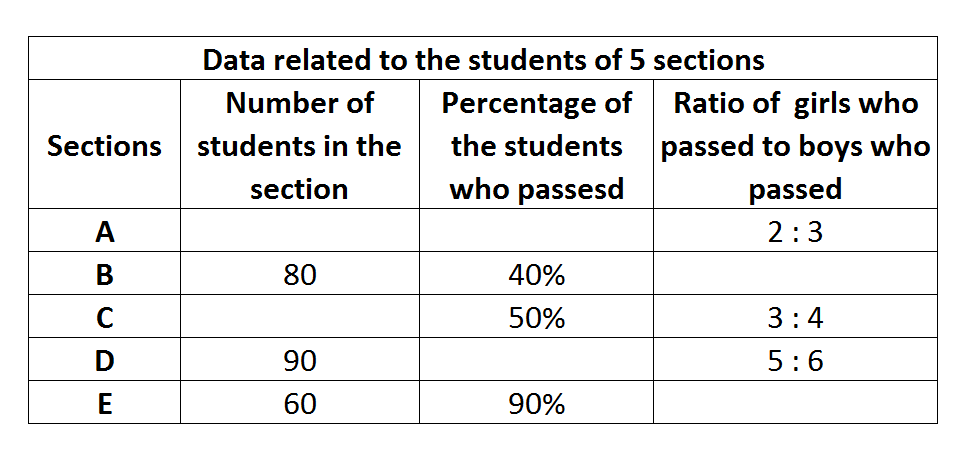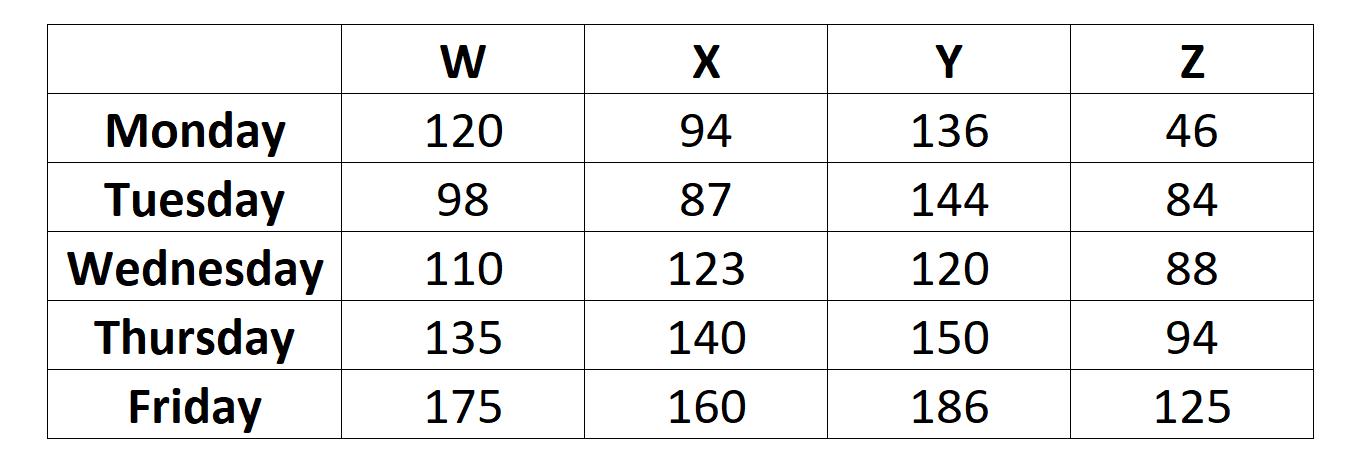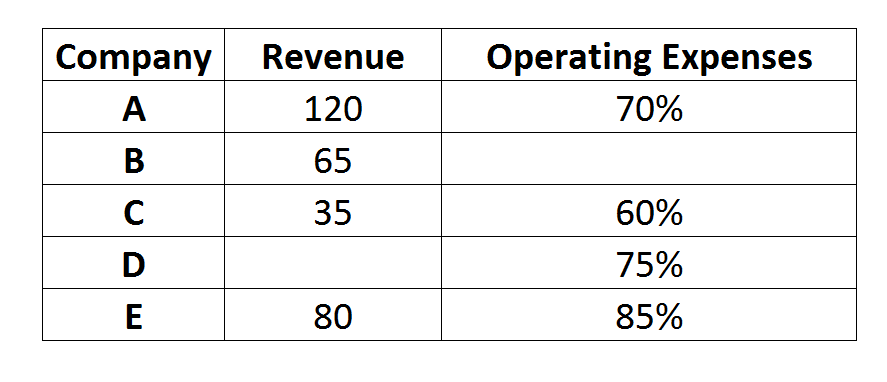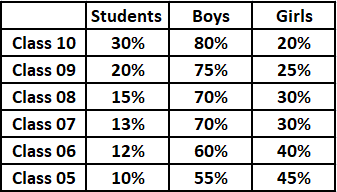SNAP Data Interpretation Questions
SNAP 2024 Data Interpretation questions

Answer the following using Pie chart and the total chocolates are 350.
Question 1
What is the difference between the person receiving highest and lowest number of chocolates ?
correct answer:-4
Instruction for set 1:

Answer the following using Pie chart and the total chocolates are 350.
Question 2
What is the average number of chocolates received by Ravi,Praful and Srujay ?
correct answer:-2
SNAP 2023 Data Interpretation questions
Refer to the table and answer the following questions.

Question 1
In section B, if 20 girls passed what is the ratio of the number of girls who passed to the number of boys who passed?
correct answer:-3
Instruction for set 2:
A Movie theatre, J cinemas, screens four movies - W, X, Y and Z. The following table gives the data about the number of viewers of each movie for five days of a particular week.

Question 2
The total number of viewers on Friday is approximately what percent greater than the number of viewers on Monday?
correct answer:-2
SNAP 2022 Data Interpretation questions
The revenue and the operating expenses as a percentage of revenue of five companies - A, B, C, D and E is given in the following table. (The revenue is given in crores)

Profit = Revenue - operating expenses.
Question 1
What is the average profit of companies A and E (in crores)?
correct answer:-3
Instruction for set 2:
The table represents the data about the number of students studying in Delhi Public School. Further, it is known that a total of 2000 students are studying in the school from Class 5th to Class 10th.

Question 2
What is the ratio of the number of boys studying in class 9th to the number of the girls studying in class 10th and class 5th combined?
correct answer:-1
SNAP 2013 Data Interpretation questions
In a school the periodical examinations are held every month. In a session during April 'X'- March 'X + 1', Rakesh a student of class IV, section B appeared for each of the periodical exams. The maximum total marks in each periodical exam is 50. The aggregate marks obtained by him in each periodical exam are given below.

Question 1
The total marks obtained in December X is what per cent more than the total marks obtained in June X ?
correct answer:-4
Instruction for set 1:
In a school the periodical examinations are held every month. In a session during April 'X'- March 'X + 1', Rakesh a student of class IV, section B appeared for each of the periodical exams. The maximum total marks in each periodical exam is 50. The aggregate marks obtained by him in each periodical exam are given below.

Question 2
(In which periodical exams did Rakesh obtain the highest percentage increase in marks over the previous periodical exams?
correct answer:-1
SNAP 2010 Data Interpretation questions
Observe the chart and answer the following questions.

Question 1
In the year 1994, the commission earned by salesman D was approximately what percent more of the commission earned by A?
correct answer:-3
Instruction for set 1:
Observe the chart and answer the following questions.

Question 2
In the year 1993, the commission of B was approximately what per cent of the total commission earned by five salesmen that year?
correct answer:-2
SNAP 2009 Data Interpretation questions
Refer to the chart below showing annual production and answer the questions that follow.

Question 1
Which industry /industries contribute /contributes to company S?
correct answer:-4
Instruction for set 1:
Refer to the chart below showing annual production and answer the questions that follow.

Question 2
Industry B processes what percentage of the total production of listed elements?
correct answer:-2
Instruction for set 1:
Refer to the chart below showing annual production and answer the questions that follow.

Question 3
Of the listed elements processed by the Industry A, how many tons are produced annually?
correct answer:-3
Instruction for set 2:
These questions are based on the graph which shows the demand and production statistics of 5 T.V. companies

Question 4
What is the difference between the average demand and the average production of the five companies taken together?
correct answer:-3
Instruction for set 2:
These questions are based on the graph which shows the demand and production statistics of 5 T.V. companies

Question 5
The production of the company D is how many times of the production of the company A?
correct answer:-1
Instruction for set 3:
The following questions are based on the pie-chart given below which gives the expenditure incurred in printing a magazine:

Question 6
What is the angle for the sector representing paper cost?
correct answer:-2
Instruction for set 3:
The following questions are based on the pie-chart given below which gives the expenditure incurred in printing a magazine:

Question 7
For a given issue of the magazine, the 2% of the cost is Rs. 2,000 and the print-run is 12,500 copies. What should be the sale price if the publisher desires a profit of 5 percent?
correct answer:-4
Instruction for set 4:
Following is a new plan called ‘Airtel One’, introduced by Airtel (GSM service Provider) for its post-paid customers.

Question 8
If Mohan made STD calls (within 100 kms) for 30 min and spent 100 min on local calls with 30% on landline, 40% in GSM and 30% on Airtel, and Rohan spent 18 min on STD within 150 Kms and spent 120 mins on local calls with 30%, 40% and 30% on GSM, landline and Airtel respectively, then who spent more?
correct answer:-2
Instruction for set 4:
Following is a new plan called ‘Airtel One’, introduced by Airtel (GSM service Provider) for its post-paid customers.

Question 9
A new SMS scheme was introduced @60p/local SMS, with an additional monthly charge of Rs. 35. Who will not benefit from the scheme? A Person sending
correct answer:-1
Instruction for set 4:
Following is a new plan called ‘Airtel One’, introduced by Airtel (GSM service Provider) for its post-paid customers.

Question 10
A bill of Rs 199/Month is definitely not possible when you make only
correct answer:-4
